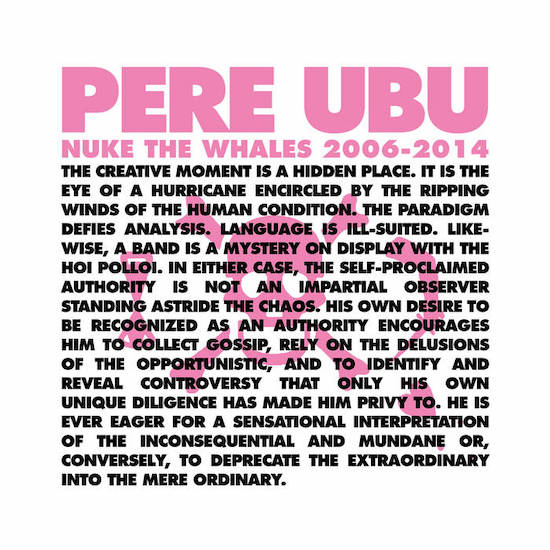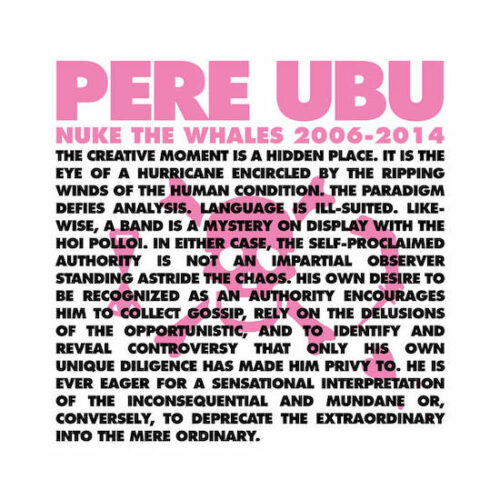Nuke the Whales, the fifth in Pere Ubu’s vinyl box set reissues series remains true to the form so far established by the preceding four. Enigmatic, provocative-sounding title in a nice white box adorned with grandiose yet stirring text (“The creative moment is a hidden place. It is the eye of a hurricane encircled by the ripping winds of the human condition.”), and inside albums that are noticeably enlivened by Thomas’ remixing and remastering. The title here appears in Robert Anton Wilson’s 1979 novel, Schrödinger’s Cat, as an invention of the character, Markoff Chaney, and also in an episode of The Simpsons from a decade later. It was also supposedly a slogan utilised by Cleveland graffiti artists, likely predating RAW’s usage.
Often when albums are reissued, any changes wrought by remastering are hard to discern. Not so with this series of releases. Ubu fans who know these albums well, myself included, have had the opportunity to rediscover recordings they thought they knew as well as the back of their own hands. The remixed version of 1988’s Tenement Year, for instance, was startlingly different. The most radical transformation here is evidenced by 2009’s Long Live Pere Ubu, a soundtrack to Ubu’s musical adaptation of Ubu Roi the pre-surrealist play by Alfred Jarry, from which the band took their name. Thomas shared vocal duties with Sarah Jane Morris (Communards, Happy End) and the original was a theatrical curio, now transmuted to a punchier rock record, with the vocals foregrounded. It’s also the least essential of the four albums – although it’s hard to fault the band’s ambition.
Lady From Shanghai (2013), which was always a personal favourite, now sounds even better. This was the album that David Thomas had originally said was his idea of “dance music fixed”. Identifying the specific changes that have been made is no easy task, as incrementally the alterations may be minimal (a foregrounding of different aspects of percussion giving an impression of the upping of tempo, for instance). But taken together the differences carry a significant impact. This is obvious from track opener, ‘Thanks’, which (still) unashamedly lifts the vocal melody from ‘Ring My Bell’ with Thomas singing “You can go to hell” as the refrain. There isn’t a weak track on this album and there are many highlights, including the groovy vocal cut-up of ‘Mary had a little lamb’ of ‘Feuksly Ma’am, The Hearing’, the Modern Dance era recalling ‘Musicians Are Scum’, and the apocalyptic dream tale of ‘414 Seconds’.
Why I LUV Women a reworked version of a 2006 album, with a slightly different title, appears on vinyl for the first time. The original title, based on the kind of story that hardboiled crime writer, Jim Thompson, might have written, was really rather off-putting, even given the noir crime proviso, so it’s encouraging to see that rectified here, especially as it’s a rather excellent album. Michelle Temple’s propulsive bass playing, Steve Mehlman’s drumming and Robert Wheeler’s synths and impressionistic electronic burbles, squeaks and squelches are the real stars here. ‘Caroleen’ and ‘Flames Over Nebraska’ are retro-futuristic garage rock classics. ‘Synth Farm’, with tenor sax from Ohio’s 15-60-75 (AKA The Numbers Band) is a harrowing journey into the unknown. ‘Love Song’, on the other hand, is (surely by intent) deeply creepy, with lines like “my eyes are growin’ tentacles for to grab you”.
Finally, 2022s version of 2014’s Carnival of Souls, adds a bit of polish and provides some slightly different perspectives on an already excellent album, originally derived from the band providing a live soundtrack to Herk Harvey’s 1962 horror film of the same name. This is perhaps the most experimental of the recordings on offer here, with a heavily processed sound that sits in between the avant-garage sound of the band’s earlier releases and the more electronic aspects of their later output. The changes made from the previous version of the album are less apparent than the other three in the box, but this is nevertheless still a powerful recording, which finds the band entirely in tune with their Ghoulardi-curated, B-movie-influenced sense of otherness. Overall this is another excellent addition to the Pere Ubu box-set reissues, essential for fans, but equally an accurate representation of where the band were at during this period in time for anyone who doesn’t know them and might want to dip in. Particularly in this latter instance, the reworked Lady From Shanghai.



